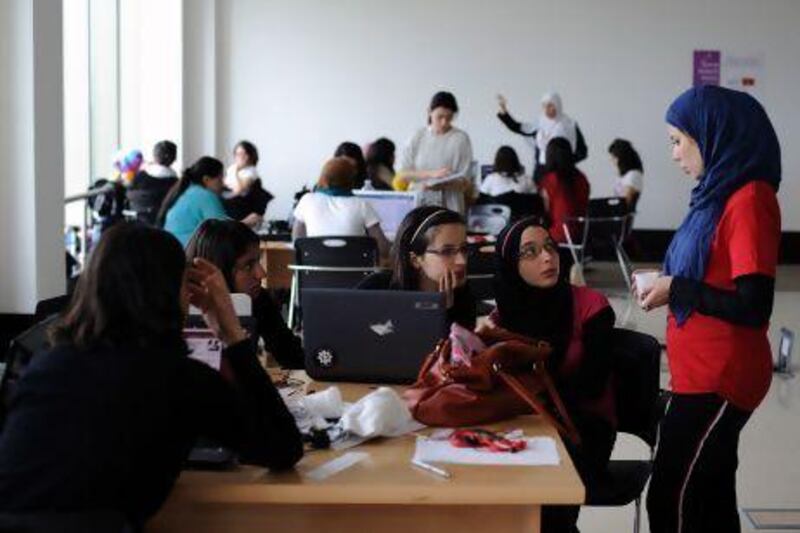ALGIERS // It was early on a weekend morning, but the teams of women technology entrepreneurs were full of energy as they had coffee and croissants before a morning polishing their business pitches.
Dressed in coloured hijabs or with bare heads, speaking English, French and Arabic, the young women enthused about their plans at the Start-up Weekend Women event.
"It's a way of encouraging young women into the technology field," said Yasmine Cherfaoui, 24, a software developer who said that most people on her university course were women. During the day, they worked in teams in the event, on business ideas such as a carpool to alleviate Algiers' congested traffic.
With its young population and access to free education up to the university level, Algeria seems to have no shortage of such entrepreneurs. The women's event was part of the Algeria 2.0 conference, a gathering held at a shiny, government-built "incubator" complex outside the capital designed to host and support new business.
But Algeria's dated infrastructure, complicated bureaucracy and a discouraging mentality are holding back enterprise, say entrepreneurs and economists. This, they say, is hindering a diversification of the economy and expansion of the private sector sorely needed in a country where there is high unemployment and dependence on public-sector jobs.
"Algeria is doing some things to help entrepreneurs, but not all that they can do," said Meriem Bouakkaz, 23, a technology graduate who was running the conference from April 15 to 20. "There are barriers."
Business people complain that there is too much bureaucracy involved in setting up a company, with multiple government departments required to authorise paperwork, which they do very slowly. Some say it is hard to find premises for a shop or office without financial backing, as they must be rented by the year.
An International Monetary Fund report published in February this year said that the non-oil sectors of Algeria's economy - which generate less money but more jobs than the oil industry - could be growing much faster if infrastructure were stronger and obstacles to business and trade smaller.
Physical infrastructure - ports and roads, for example - is less developed than in much poorer countries such as Egypt or Tunisia, the report found, and a complicated taxation system discourages private enterprise. Import and export businesses face a number of restrictions, designed to prevent inflation, which are off-putting to Algerian and foreign businesses, and access to credit is difficult, especially for small businesses.
But the most common complaint among the young business community is the technological and banking infrastructure of the country, which they cite as constantly frustrating their efforts to operate in a globalised market.
"The main problem in Algeria is that we can't pay for things online," said Asthma Bellili, 24, a PhD student. "E-payment is forbidden by the government, but it's not difficult to put in place. There are the skills, there are the servers - why don't we do it?"
There is no mobile internet or 3G access in Algeria. Online banking and payments are not possible from an Algerian bank account either inside or outside the country. Technological entrepreneurs cannot buy or sell an application on iTunes, or update the software on their computers. They cannot buy an aeroplane ticket or a subscription to a newspaper, or set up an online payment system for anything they provide.
"It is the biggest gap between Algeria and other countries," said Ihsane El Kadi, the business editor of the Maghreb Emergent website. "The effect is catastrophic."
"The Algerian government is very old and old-fashioned," he said, reflecting a common view that the ailing 76-year-old president Abdelaziz Bouteflika and a cabal of powerful generals do not share the same aspirations for the country as their youthful population.
It is true that Algeria had a civil war during the 1990s when more fortunate countries were having the dot-com bubble, which held back growth and development. But Mr El Kadi suggested that the slowness to modernise might also have a political dimension.
"It's not just because they have this old-fashioned view," he said. "They worry that if they open the way, if the young people have good communications and information technology, it will represent a political risk to them as it means they will not be in control."
Ramzi Charif is the co-founder of BeYTE Datacenter, an Algerian start-up, which used the business incubator for cheap office space and spoke at Algeria 2.0 about cloud computing to an audience of mostly young people involved in technology businesses such as web design or running online listings sites.
"I think it is difficult to change mentalities," he said, of the mindset of the Algerian authorities. "When you have young people, it's always easy, but it's difficult to have people do the same thing for 10 years and then ask them to change."
The country, he added sadly, is "flagging".
"There are companies, money, space - but the framework is missing, everything in relation with how a business is set up … I think this is one of the main restrictions that is preventing Algeria from lifting off."
[ afordham@thenational.ae ]





